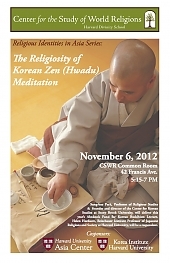Date:
Location:
Religious Identities in Asia Seminar Series

Sung-Bae Park, Professor of Religious Studies, Stony Brook University
Professor Sung-bae Park specializes in Buddhism, East Asian Philosophy and Religion as well as interfaith dialogue such as Buddhist-Christian dialogue and Buddhist-Confucian debate in Korea. He is the founder and director of the Center for Korean Studies at Stony Brook. He has taught various courses ranging from Chinese, Japanese and Korean Buddhism to Confucianism and Taoism, since 1977.
He received his Ph.D. in Buddhist Studies from the University of California at Berkeley in 1978. His publication includes Buddhist Faith and Sudden Enlightenment (SUNY Press, 1983) and The Korean Buddhist Canon: A Descriptive Catalogue (with Lewis Lancaster, University of California Press, 1979). He is the general editor of the Wonhyo Translation Project as well as the translator of "Wonhyo’s Commentaries on the Awakening of Faith" from Collected Works of Wonhyo. Currently he is researching on the T’i-yung construction as an East Asian way of thinking and the debates between Subitist and Gradualist approaches toward Buddhist Enlightenment and Practice.
Chaired by Helen Hardacre, Reischauer Institute Professor of Japanese Religions and Society
Abstract
Many Korean Zen Buddhists are now crying out for help. They seem to be in the throes of a crisis, since they are missing the religiosity of Zen (Hwadu) Meditation. Their problem is not a neglect of practice, but their attachment to a causal way of thinking. As a result, they see their Zen (Hwadu) meditation as a way to get enlightenment, and this means that Hwadu is treated as a method to achieve a goal. In this lecture I offer my advice: Please try to realize what "The Religiosity of Zen Meditation" actually is.
Jointly sponsored by the Asia Center, the Center for the Study of World Religions, and the Korea Institute